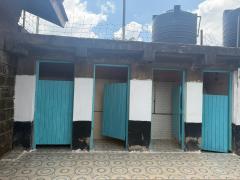Enforcement Of Ministry Of Health Protocols On COVID-19 At USIU-Africa
With the upsurge in COVID-19 infections, that we have witnessed recently it is critical to promote a positive and safe learning and working environment at the University. Because COVID-19 spreads mainly through exhaled aerosols produced through coughing, breathing and talking, face coverings and social distancing are essential to controlling the spread of the virus during certain situations especially when in an enclosed environment e.g. while students are in class. We recognize that adaptation to these new expectations and habits will take some time. It is therefore important to establish a culture of support and caring to ensure long-term behavioral change.
(a) Student Enforcement
The University community will first seek to work with students to help them adapt and provide supportive and educational opportunities to respond to a non-compliance. Faculty are encouraged to include a summary of the health and safety protocols in the course syllabus or to discuss these requirements on the first day of class to increase awareness in the University’s expectations and response. The following progressive measures will be administered to address student non-compliance:
- Ask the student to comply with the requirement for which a violation has been observed.
- Ask the student to leave the classroom and/or office and return when they are ready to follow the requirement.
- Staff: If the student refuses or fails to follow the protocol, start by asking them to leave and if they refuse to leave call your supervisor for assistance, and submit a COVID-19 - specific incident report to the Dean for further action.
- Faculty: If the student fails to follow the protocol, start by asking them to leave and if they refuse to leave inform the department head or Dean for assistance; end class early or reschedule class; and submit a COVID-specific incident report to the Dean providing details of the incident.
A student’s failure or refusal to follow the COVID-19 protocols as guided by the Ministry of Health may be considered a threat to the health and safety of the community and may result in a student’s temporary or permanent removal from the University. Additional outcomes may include building restrictions, removal from housing, additional trainings and additional interventions.
(b) Faculty and Staff Responsibility and Enforcement of COVID-19 Protocols
All employees are expected to carry out their duties honestly, in good faith, and with diligent care. The Occupational Health & Safety Act (OSHA) stipulates that employees have a duty to ensure their own safety, cooperate with their employer and or any other person in ensuring their safety and report any other dangers and COVID-19 is incorporated in this. Therefore, employees must adhere to all COVID-19 protocols with very limited exceptions, such as when the employee has provided supporting documentation that wearing a face covering inhibits the employee’s health.
Thus, the University will seek to work with employees to help them adapt to the Ministry of Health (MOH) protocols through support and educational opportunities to respond to a non-compliance. Supervisors are encouraged to refer employees to town halls to learn about the health and safety protocols and hold quarterly meetings to review current protocols and to promote transparency in the University’s expectations and response.
For employees who do not provide the necessary documentation for exemptions and/or willfully ignore COVID protocols, the following corrective actions could be taken:
- Supervisor gives verbal warning and direction to follow protocol. Supervisor keeps documentation of the verbal warning.
- If there are multiple instances of non-compliance, the supervisor may issue a written reprimand to the employee. The supervisor, after consultation with Human Resources, will provide the written reprimand to the employee, as per the provisions of the HR Policy & Procedures.
- If the employee continues to refuse to comply with applicable protocols, the supervisor can contact the university security office to ask that the employee be denied access.
- Continued non-compliance by the employee may lead to additional corrective action measures, up to and including termination of employment.
(c) Visitors Responsibility and Enforcement
Visitors will not be allowed to access the campus in principle except for suppliers. However, in cases where they have to, they must comply with all MOH protocols, including wearing a face covering at all times while on campus (inside buildings and outside) and maintaining 1.5m distancing to help prevent the spread of the virus.
The campus host will inform them of MOH/ university protocols and review key elements to provide transparency in the University’s expectations and response. The host must work with them to help them adapt and provide supportive and educational opportunities to respond to non-compliance. Visitors who do not comply with applicable protocols will be:
- Asked by the campus host or campus host’s supervisor to immediately comply with the applicable protocols or leave campus.
- If the visitor fails to comply with this directive, the internal security team may respond and request that the visitor leaves campus.
- If the visitor continues to fail to comply, the security may contact the police and ask them to issue a citation for trespassing.






